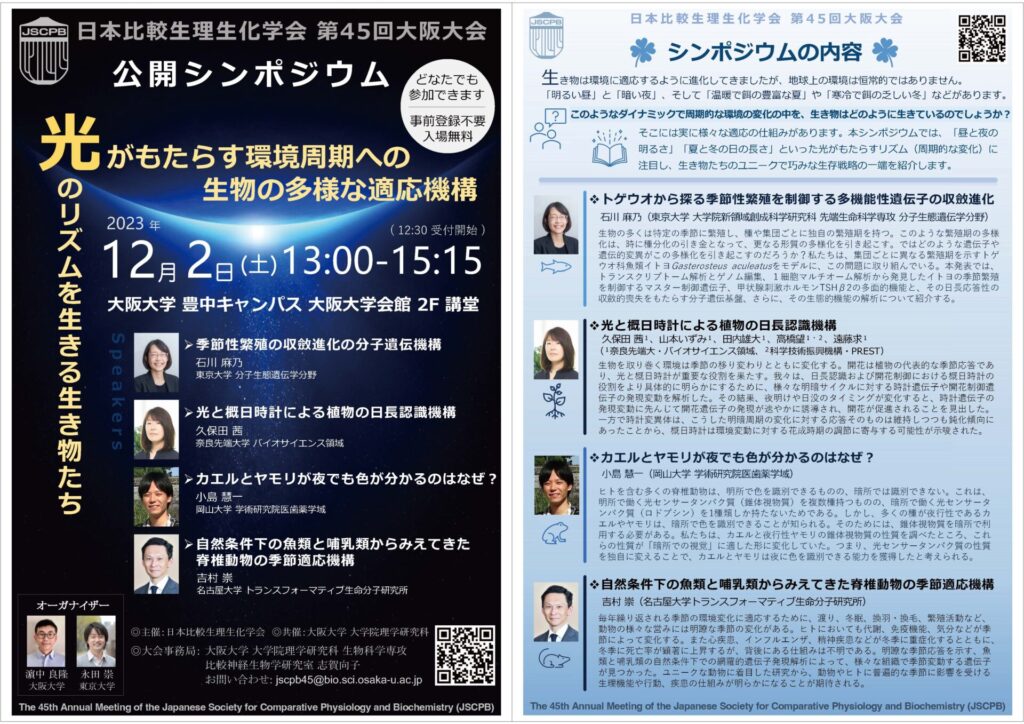Public symposium: Diverse adaptation mechanisms of organisms to environmental cycles driven by light

1:00pm – 3:15pm, Saturday, December 2, 2023
Osaka University Hall, Auditorium (2F)
Diverse adaptation mechanisms of organisms to environmental cycles driven by light
Subject and Contents of the Symposium:
The Earth rotates on its axis that is tilted slightly away from the revolution axis, revolving around the sun. As a result, day-night cycles occur approximately every 24 hours and seasonal changes do every year in many regions on Earth. Such changes involve variations in light, temperature, food resources, and other environmental factors; these are generally periodic and thus can be predicted in advance, allowing organisms to adapt to the cyclic changes.
To adapt to daily light-dark cycles, many organisms have evolved circadian rhythms that regulate activity timing and energy metabolism, etc. Additionally, it is widely believed that organisms have acquired photoperiodism, a mechanism that responds to changes in day length, on the way they expanded their habitats to higher latitudes or altitudes with large seasonal temperature variations. The acquisition of photoperiodism has enabled organisms to enter a special physiological state, i.e. hibernation or diapause, to survive harsh seasons, as well as to concentrate growth and reproduction effectively during warm and resource-rich seasons.
Therefore, organisms share common frameworks for adapting to environmental cycles associated with light changes, such as circadian rhythms and photoperiodism. However, the ways organisms experience environmental changes and adapt to them are highly diverse. This symposium aims to explore organisms’ adaptation mechanisms to changes of both “daily light-dark cycles” and “photoperiod.” We will introduce fascinating adaptive strategies that various organisms use in order to cope with such light environmental cycles on Earth.
- Organizers:
Yoshitaka Hamanaka [Graduate School of Science, Osaka University ]
Takashi Nagata [The Institute for Solid State Physics, The University of Tokyo] - Speakers & Talk Titles
- S1-1: Asano Ishikawa [Department of Integrated Biosciences, Graduate School of Frontier Sciences, The University of Tokyo] Molecular genetic basis underlying convergent evolution of seasonal reproduction in sticklebacks
- S1-2: Akane Kubota1, Izumi Yamamoto1, Yudai Tanai1, Nozomu Takahashi1, 2, Motomu Endo1 [1Div of Bioscience, NAIST; 2JST・PREST] Day-length measurement in plants mediated by light and the circadian clock
- S1-3: Keiichi Kojima [Faculty of Medicine, Dentistry and Pharmaceutical Sciences, Okayama University] Molecular mechanism underlying the special ability of frogs and geckos to recognize color at night
- S1-4: Takashi Yoshimura [Institute of Transformative Bio-Molecules (WPI-ITbM), Nagoya University] Seasonal adaptation mechanisms of vertebrates revealed by medaka and macaque kept under natural environment